October 20, 2017 By: Abhishek Jana
POS (Point of Sale) is a combination of software and hardware that makes transactions efficient for business owners. POS solutions encompass a register, barcode, cash drawer, a receipt printer and a debit card reader.
POS is where payment is calculated and amounts to pay given. A cash transaction may follow where money is handed over and the receipt printed, or, depending on the type of the transaction, an invoice may be issued followed by a cash payment. A receipt is then printed to acknowledge the cash payment.
When implementing POS for your business, a well-laid plan is essential. Consider factors and features that your POS should have for it to work efficiently for a better outcome. Its features must be able to maximize its performance. Consider its flexibility, how friendly it is to use by your staff and the security of your data.
Factors to Consider Before Implementing POS:
Choice of POS
Before making a final decision on what POS to use, conduct research and compile some POS systems based on your workload. Read reviews from business owners running a business and gain useful insight into what will work best for your enterprise.
Train and Engage Staff
Consult your managers and employees and get their feedback on what features will work best for them. Put into consideration that your employees will be the ones to use POS, so it has to be easy for them to use.
Train your employees and managers so that they can have a good understanding of the system and its features. Also, you should hold demos with your staff before implementing POS to see how they handle and manage the system.
The Four Primary Capabilities
There are significant features that POS should have before implementation. These features should be integrated to achieve better solutions for POS.
- Sales Reporting: Records and analyses data to give useful business decisions.
- Customer Management: Collects important customer details and helps to keep in touch with them.
- Inventory Management: Keeps records of the quantity of stock and helps to know when to make an order.
- Employee Management: Manages employee’s hours, schedules and payroll. It helps with accountability and organizes the office operations.
Security
Security should be number one priority when implementing POS solutions. It should have a proper program that ensures that your client’s credit card details and data are secure and privacy maintained.
Purchase a POS system that is EMV compliant. Secondly, it should be able to safeguard your business from staff theft. Your POS system should have a notification system that alerts the security personnel and business owners of any suspicious transactions/activities.
Conclusion
The most important functions that the POS system offers are solutions to managing data transactions efficiently and simplifying your business operations. The system should be able to meet your business requirements and have the capacity to handle your workload.
Train your staff adequately on its functionality and make sure they understand how it works to avoid errors and delays. Get feedback from them on whether it is user-friendly and fast enough for your business transactions.
Lastly, implement POS solutions that serve your business efficiently with high performance for a better customer experience and delivery.



